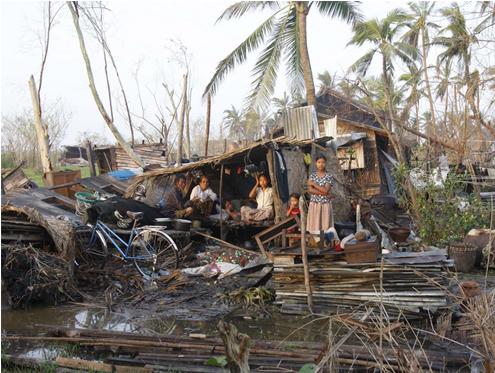Burma ranks among the world’s top countries most at risk from the combined effects of climate change, according to a new report by the Asian Development Bank that joins together various studies to shed a new and ominous light on the vulnerability of the underdeveloped Southeast Asian state.
The report spotlights the Asia-Pacific as the most disaster-prone region on earth, and warns that new patterns of migration are likely to emerge as populations escape humanitarian crises brought about by global warming. More than 42 million people in the region have been forced to leave their homes due to environmental disasters during the past two years alone, and that figure is set to increase.
It says that a rise in sea levels presents the most pressing concern, with eight of the 10 countries with the greatest number of people inhabiting low-lying coastal zones living in the Asia-Pacific. In Burma, 10 percent of the country would be affected by a sea-level rise of between one and five metres.
Poverty and weak governance compounds the vulnerability of those living in areas prone to the negative effects of climate change. In Burma this is most evident in the Irrawaddy delta and the stretch of coastline in central Arakan state around Ramree Island – both areas are of low-elevation, and decades of neglect by the central government has meant that disaster warning and flooding prevention systems are woefully lacking.
A separate index developed last year by David Wheeler, a senior fellow at the Centre for Global Development, casts this combination of factors in a more urgent light. When the potential physical impacts of three effects of climate change – agricultural productivity loss, sea level rise and extreme weather – are combined with the coping ability of the state, Burma ’s threat levels are raised dramatically.
He claims that Burma ranks second out of 233 countries in terms of the threat posed by agricultural productivity loss, an unsurprising figure given that around 70 percent of the country are reliant on farming as a primary means of income. Agricultural exports are also a key pillar in the country’s developing economy.
Burma also comes in second place for the dangers that will accompany a rise in sea levels. According to a dataset created by Wheeler, nearly 4.5 million Burmese inhabit areas designated at risk from storm surges. Other countries have higher figures for this, namely China with 23.7 million, but Wheeler considers Burma ’s coping ability so poor that only Somalia tops it in terms of susceptibility to sea level rises.
Regarding the fallout from extreme weather, Burma ranks fifth on Wheeler’s index. According to the ADB report, “many more people” in Southeast Asia died as a result of natural disasters between 2001 and 2010 than during the previous decade, primarily due to the 2004 India Ocean tsunami and 2008’s Cyclone Nargis, whose aftermath showcased the Burmese government’s inability to respond to extreme weather.
Wheeler told DVB in an interview that the coping ability perspective in assessments on climate change “reinforces the view that adaptation is primarily a development problem, with all the associated opportunities and constraints”.
“Accepting this idea would recast adaptation assistance, with renewed attention to ‘traditional’ issues like women’s education and institutional development”. He added that Burma’s ability to handle problems associated with climate change would strengthen in tandem with democratisation, local development and the empowerment of marginalised groups.
The report however attempts to illuminate a silver lining by suggesting that the by-products of climate change, namely human migration, “should be seen not only as a threat to human well-being but also as a potential tool to promote human adaptation to climate change”.



